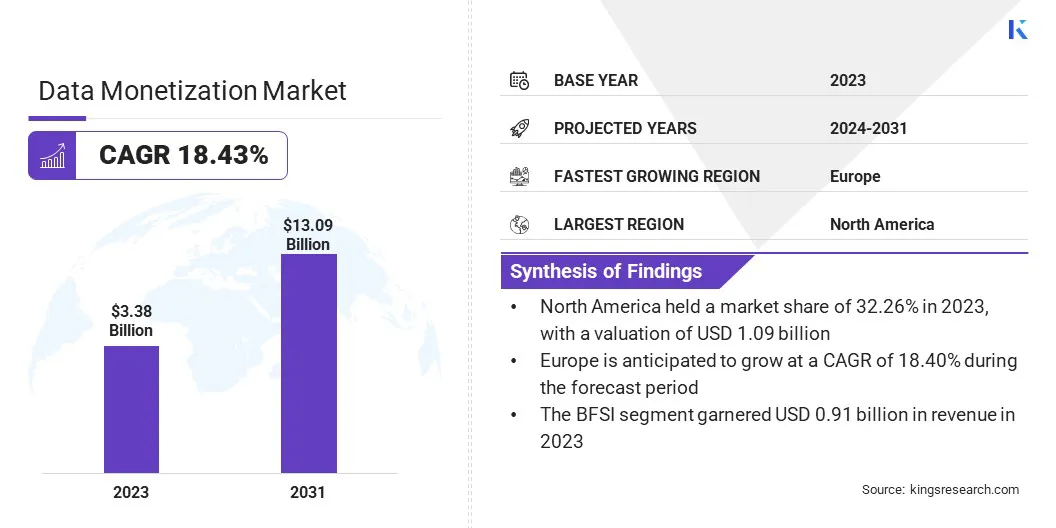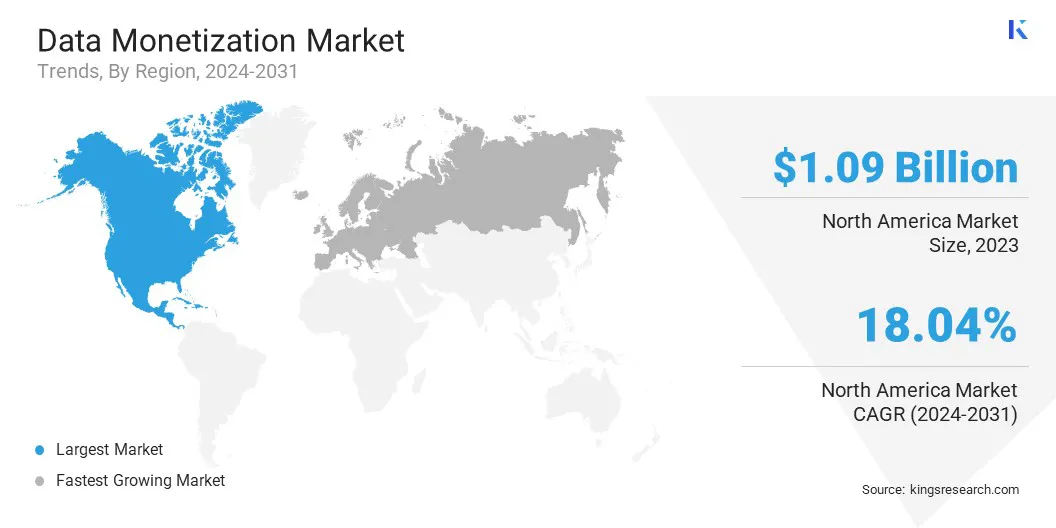Data Monetization Market Size
The global Data Monetization Market size was valued at USD 3.38 billion in 2023 and is projected to reach USD 13.09 billion by 2031, growing at a CAGR of 18.43% from 2024 to 2031. In the scope of work, the report includes products offered by companies such as Sisense Ltd., Dawex Systems, Trianz, Oracle, Microsoft, Cisco Systems, Inc., Salesforce, Inc., Adastra, Infosys Limited, NETSCOUT, and others.
The exponential growth of data has become a defining feature of the modern digital landscape. With the advent of technologies such as the Internet of Things (IoT), artificial intelligence (AI), and social media, global data volumes have skyrocketed. The proliferation of connected devices, online transactions, and digital interactions is contributing to this exponential growth, thereby fueling the need for robust data management and analytics solutions.
Moreover, finance departments leverage big data from internal and external sources to optimize cash flow, monitor profit margins, and manage expenses. Similarly, HR departments utilize data to reduce workforce uncertainty, track employee metrics, and retain talent. These applications harness big data to streamline business operations and drive market expansion through effective monetization strategies.
Data monetization is the process of deriving economic value from data assets, including selling data to third parties, leveraging data to enhance products and services, and providing data-driven insights to other businesses. Data monetization solutions typically involve advanced analytics tools and platforms that enable organizations to extract actionable insights from their data. Several industries, including retail, finance, healthcare, telecommunications, and manufacturing, leverage data monetization to unlock new revenue streams, optimize operations, and gain a competitive edge in the market.

Analyst’s Review
The outlook of the data monetization market is characterized by rapid expansion and ongoing evolution. As businesses increasingly recognize the value of their data assets, the demand for data monetization solutions continues to grow. The market landscape is shaped by a proliferation of data analytics tools and platforms aimed at helping organizations derive insights and extract economic value from their data.
The growth outlook for the data monetization market remains positive, fueled by various factors such as the increasing volume of data, advancements in data analytics technologies, and the growing emphasis on data-driven decision-making across industries. However, challenges such as data privacy concerns and regulatory complexities to realize the full potential of data monetization.
Data Monetization Market Growth Factors
Cloud adoption is playing a pivotal role in fostering the growth of the data monetization market. The scalability, flexibility, and cost-effectiveness offered by cloud computing enable organizations to easily store, manage, and analyze large volumes of data. Cloud-based data analytics platforms allow businesses to leverage advanced analytics tools and techniques without the need for significant upfront investment in infrastructure.
Moreover, the cloud provides a secure and reliable environment for data storage and processing, effectively addressing concerns regarding data privacy and security. As businesses increasingly migrate their data and analytics workloads to cloud platforms, the barriers to entry for data monetization are lowered, making it more accessible to organizations of all sizes. Cloud adoption further facilitates collaboration and data sharing, enabling companies to monetize their data assets more effectively through partnerships and ecosystems.
Data security concerns represent a significant restraint in the data monetization market. As organizations increasingly collect and analyze large volumes of data, the risk of data breaches and cyberattacks becomes more pronounced. Data breaches incur severe consequences, including financial losses, reputational damage, and regulatory penalties. Consequently, businesses prioritize data security measures to safeguard sensitive information and maintain customer trust.
Factors contributing to data security concerns include the proliferation of connected devices, the complexity of data ecosystems, and the evolving threat landscape. Compliance with regulations such as GDPR, CCPA, and HIPAA adds another layer of complexity, requiring organizations to implement robust data protection mechanisms and ensure regulatory compliance. Addressing data security concerns necessitates a multi-faceted approach encompassing encryption, access controls, threat detection, and incident response capabilities.
Data Monetization Market Trends
The rise of advanced analytics is a prominent trend shaping the data monetization market dynamics. Advanced analytics techniques, such as machine learning, predictive modeling, and natural language processing, enable organizations to extract deeper insights and derive more value from their data assets. These advanced analytics capabilities empower businesses to uncover hidden patterns, forecast future trends, and make data-driven decisions with greater confidence.
With the proliferation of big data and the increasing complexity of business environments, traditional analytics approaches are no longer sufficient to leverage the potential of data. Advanced analytics tools and algorithms offer more sophisticated ways to analyze and interpret data, leading to more accurate predictions and actionable insights. Additionally, advancements in AI and automation are driving the democratization of analytics, thereby extending access to these powerful tools to a wider range of users across organizations.
Segmentation Analysis
The global data monetization market is segmented based on component, deployment, vertical, and geography.
By Component
Based on component, the market is categorized into solutions and services. The solution segment dominated the market with a share of 71.93% in 2023 on account of the increasing demand for advanced analytics tools and platforms. Organizations across industries are actively seeking comprehensive solutions to effectively leverage the value of their data assets, aiming to derive actionable insights.
Advanced analytics solutions offer a wide range of capabilities, including data visualization, predictive modeling, and real-time analytics, enabling businesses to extract valuable insights from their data and drive informed decision-making. Moreover, the growing complexity of data ecosystems and the proliferation of big data require robust and scalable solutions to effectively manage and analyze large volumes of data.
By Deployment
Based on deployment, the market is divided into on-premises and cloud-based. The cloud-based segment is anticipated to witness the highest CAGR of 20% over the forecast period as a result of the increasing adoption of cloud computing technologies. The flexibility of cloud-based solutions enables organizations to quickly deploy and integrate new data monetization initiatives, accelerating time-to-market and fostering innovation.
Furthermore, the cloud provides a secure and reliable environment for data storage and processing, addressing concerns regarding data privacy and security. As businesses continue to migrate their data and analytics workloads to the cloud, the demand for cloud-based data monetization solutions is expected to surge in the forthcoming years.
By Vertical
Based on vertical, the market is bifurcated into BFSI, e-commerce & retail, it & telecommunications, manufacturing, healthcare, and others. The BFSI segment garnered the highest revenue of USD 0.91 billion in 2023, mainly propelled by the increasing focus on data-driven decision-making and regulatory compliance. The BFSI sector, characterized by its data-intensive nature, generates vast amounts of data through transactions, customer interactions, and risk management activities.
As competition intensifies and customer expectations evolve, BFSI organizations leverage data monetization strategies to gain insights into customer behavior, optimize operations, and mitigate risks. Advanced analytics tools and platforms enable BFSI companies to analyze extensive volumes of structured and unstructured data, uncovering hidden patterns and trends crucial for driving business growth and fostering innovation.
Data Monetization Market Regional Analysis
Based on region, the global data monetization market is classified into North America, Europe, Asia-Pacific, MEA, and Latin America.

The North America Data Monetization Market share stood around 32.26% in 2023 in the global market, with a valuation of USD 1.09 billion, mainly fueled by the region's advanced technological infrastructure, strong focus on innovation, and early adoption of data monetization strategies. With major tech hubs such as Silicon Valley and leading companies driving advancements in data analytics and cloud computing, North America continues to lead the data monetization market.
Additionally, the presence of numerous multinational corporations across various industries, including technology, finance, healthcare, and retail, is contributing to the region's dominance in the data monetization market. Furthermore, conducive regulatory environments and a culture of entrepreneurship in North America encourage businesses to explore innovative ways to monetize their data assets.
Europe is likely to experience significant growth at an 18.40% CAGR between 2024 and 2031. This considerable growth is primarily attributed to the increasing adoption of data-driven decision-making practices across industries in the region. European businesses are recognizing the value of their data assets and are investing heavily in advanced analytics tools and platforms to derive actionable insights.
Additionally, Europe boasts a strong ecosystem of technology startups and innovative enterprises, fostering a culture of innovation and entrepreneurship in the data monetization space. Furthermore, initiatives such as the European Union's Digital Single Market strategy aim to promote the free flow of data across borders, facilitating data sharing and collaboration among businesses.
Competitive Landscape
The global data monetization market will provide valuable insight with an emphasis on the fragmented nature of the industry. Prominent players are focusing on several key business strategies such as partnerships, mergers and acquisitions, product innovations, and joint ventures to expand their product portfolio and increase their market shares across different regions. Manufacturers are adopting a range of strategic initiatives, including investments in R&D activities, the establishment of new manufacturing facilities, and supply chain optimization, to strengthen their market standing.
List of Key Companies in Data Monetization Market
- Sisense Ltd.
- Dawex Systems
- Trianz
- Oracle
- Microsoft
- Cisco Systems, Inc.
- Salesforce, Inc.
- Adastra
- Infosys Limited
- NETSCOUT
The Global Data Monetization Market is Segmented as:
By Component
By Deployment
By Vertical
- BFSI
- E-commerce & Retail
- IT & Telecommunications
- Manufacturing
- Healthcare
- Others
By Region
- North America
- Europe
- France
- U.K.
- Spain
- Germany
- Italy
- Russia
- Rest of Europe
- Asia-Pacific
- China
- Japan
- India
- South Korea
- Rest of Asia-Pacific
- Middle East & Africa
- GCC
- North Africa
- South Africa
- Rest of Middle East & Africa
- Latin America
- Brazil
- Argentina
- Rest of Latin America


